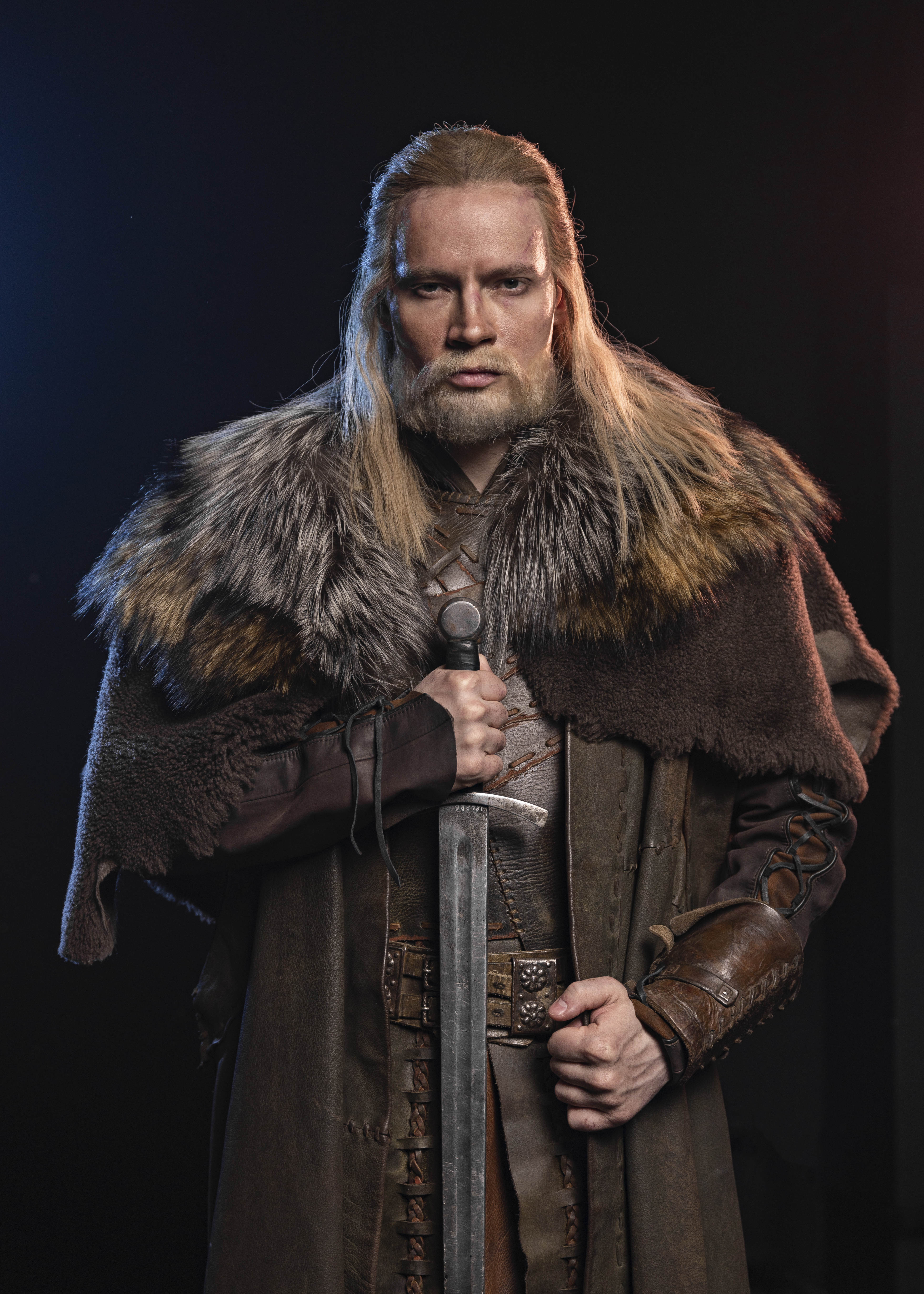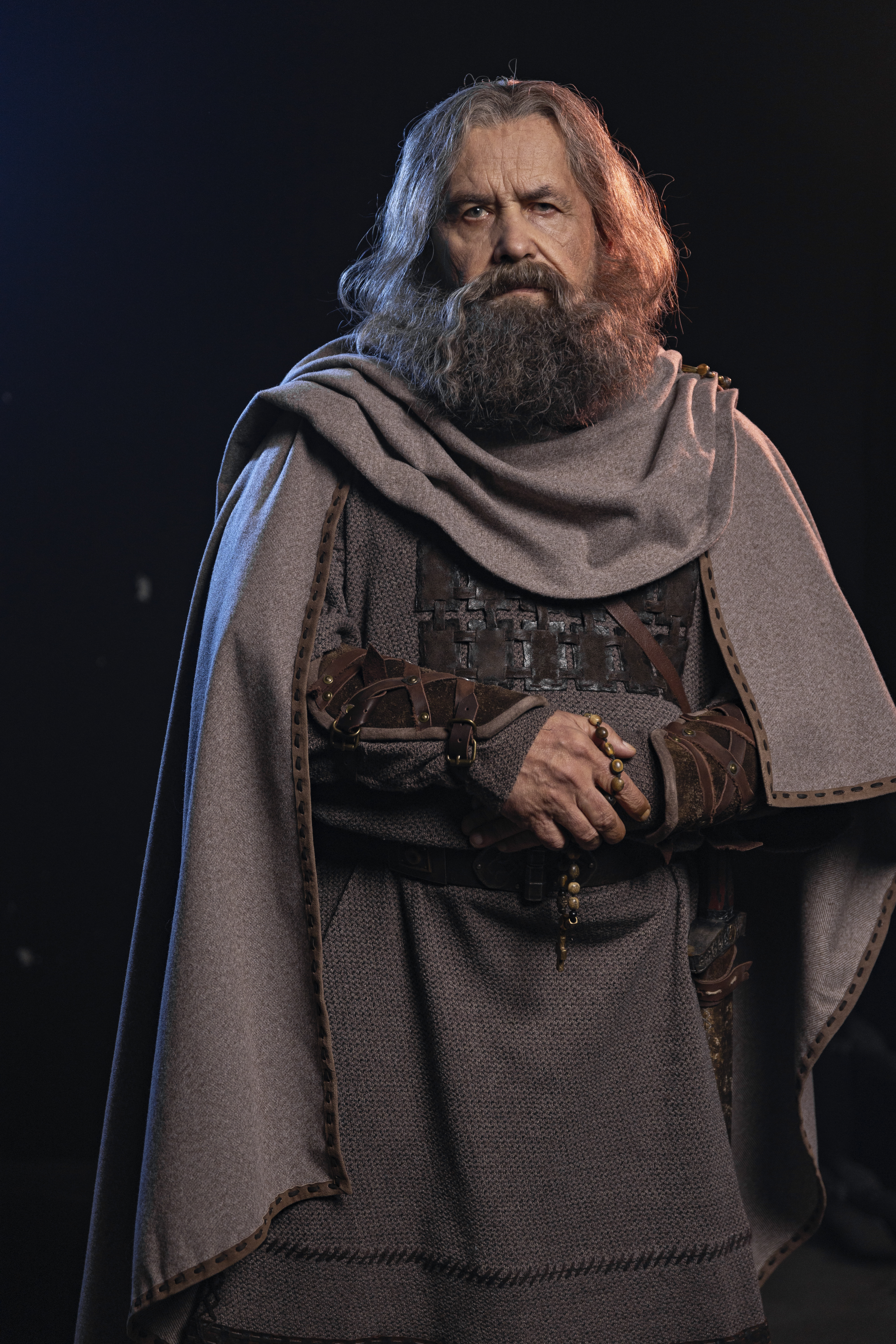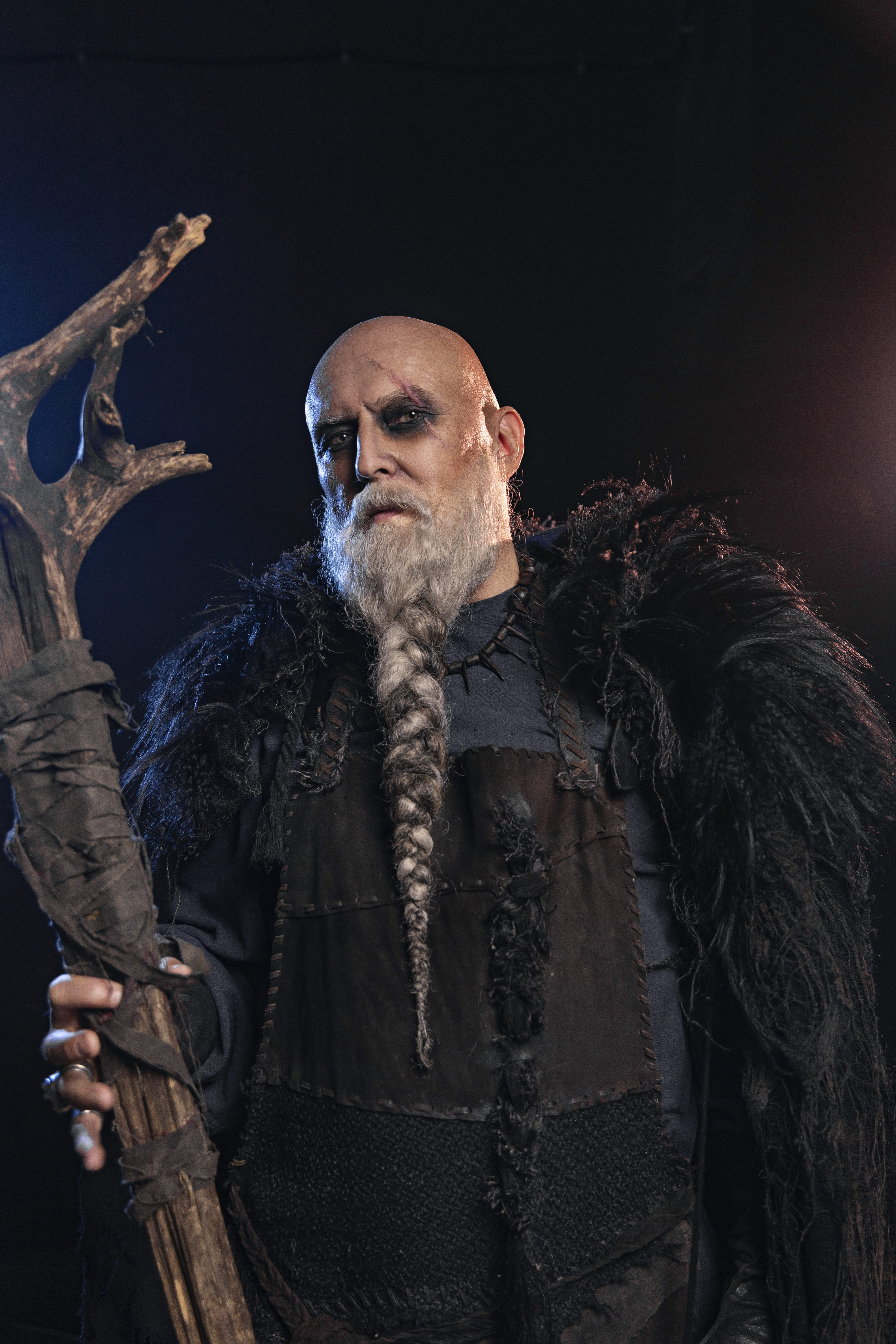"SHAMAN in Prince Vladimir makeup looks remarkably like a rocker."

If after watching the ethno-opera "Prince Vladimir" some of the audience will come to church, it will be a major gift for Igor Matvienko. On February 6, the People's Artist of Russia is 65 years old. He will celebrate his anniversary on February 5 and 6 on the stage of the State Kremlin Palace. To the significant date is timed to the premiere of "Prince Vladimir", the material of which the composer wrote ten years. SHAMAN will make his debut in the title role. The jubilee himself will appear as the villain Odin Gangrad. His antagonist will be played by People's Artist of Russia Nikolai Rastorguev. About the labor of a lifetime, anniversary fever and panic attacks Igor Matvienko told "Izvestia" on the eve of the premiere.
"When they made up Nikolai Rastorguev, in front of me stood the spitting image of Karl Marx"
-You invited the most popular performers to take part in the opera - SHAMAN plays Prince Vladimir, and Nikolai Rastorguev plays his handmaiden Fyodor. How did you manage to convince the folk artist to step on the thin ice of the experiment?
- Nikolai Rastorguev, in fact, very much likes to experiment. Especially in everything to do with cinema and theater. So when I suggested it to him, I didn't think that he would say "it's not my thing". He happily agreed. And then, Fyodor in our opera is a collective image. And since our prince is young and inexperienced, he must have a mentor by his side. Fyodor together with Vladimir makes the way from Viking to the first Christian martyrs. Well and then, he is an antagonist to Odin Gangrad, a fantastic character.
- You're playing Odin in the play. The artists came up with an ominous makeup for you. Were you involved in creating the visuals?
- I didn't advise anything, I just let my beard go. Turns out you shouldn't have. Because when they glue an artificial one on their own, then for two days you have to tear it off in shreds. I felt what waxing is like.
- Did they draw black eyes on you so you could see from the back row of the Kremlin?
- No. I remember when there was a presentation of excerpts of "Prince Vladimir" at the "Tavrida" (Art Cluster. - Ed.), I went on stage in this image. SHAMAN is opposite. I look at him, and he lowers his eyes. And afterward he says, "I can't look you in the eye in this makeup. Something's depressing me." - "Be patient, brother."
When I saw how Nikolai Rastorguev was made up, he looked like Karl Marx in front of me. So inspired at once. A completely changed man.
- Did you have to remake him?
- Something remained. The character of Nikolai has some historical depth. Even the surname itself - Rastorguev, as if "from there".
-Who does SHAMANlook like ?
- When Yaroslav was first made up, I thought he looked remarkably like a rocker, as if from the band "Aria". But Yaroslav himself likes it very much. He in the image of Vladimir is much older, more masculine, more brutal.
" SHAMANenters , and suddenly all the children are hysterical. "
-VTsIOM conducted a poll and it turned out that 38% of respondents consider SHAMAN the most popular artist in our country. And in the United States, Taylor Swift remains the idol with an army of fans. She has the largest subscription audience. What do you think is the strength of these artists? Is it possible to compare them?
- As for Taylor Swift, I'm going to get a little bit free later and listen to her. I'm very interested to see the phenomenon of this artist, why she became such an idol. Well, just from the songs it is not clear.

- Weak?
- No, good strong songs, but there are plenty of such songs around. The same Ariana Grande. So I can't say anything about Taylorization or Swiftomania.
As for SHAMAN, I totally understand why he became a folk hero.
- Why?
- Because it was February 22, 2022 when the world completely changed. Vladimir Vladimirovich announced that the DNR and LNR were part of Russia. It was at this moment, without guessing anything, that Yaroslav released his song "Let's Stand Up". For some reason it "came down" to him, it was born inside. I have never met such songs in our new history. It was written from the heart, without any calculation for the situation. And then he finished everyone with the composition "I'm Russian", which came out a few months later. And he immediately flew into space.
It was a revelation for me when he and I happened to be together in the jury of the Children's New Wave. There were respected people in the audience - Larisa Dolina, Dima Malikov, me. And then SHAMAN enters, and suddenly all the children were hysterical. They chorally sang "I am Russian". After that the show starts, and 13-14 year old girls don't look at the stage, they are interested in SHAMAN. They catch his every look.
They said that when SWO ends, SHAMAN will end. It won't. It's over. He's reached an audience of adults and children. And once he's in front of kids , it's forever.
- Some smart artists say you gotta count on the children's audience. That's how they cultivate their fans.
- The thing is that show business in general is designed for teenagers. Because after twenty a normal person should no longer pay attention to artists, to songs. He begins his adult life: work, family and so on. It is the teenage age that allows you to create your own heroes, idols. Of course, they then follow the artist throughout his life.
- Show business is divided into two camps. Some support and others deny the presence of SHAMAN. Could it be that he is out of showbiz?
- He is certainly in showbiz. The thing is that he is a phenomenon, and such that there is a very polar attitude towards him. Either he is loved and accepted, or he is hated, thinking that he is a creator. To put it conditionally, someone loves Lyube, and someone is not a fan of their work. And with SHAMAN it's different. I observe either complete rejection or, on the contrary, endless love.
- What is the mystery of the artist? Maybe it's the songs? Will you, as an author, evaluate?
- SHAMAN is epathetic. He behaves like a rocker on stage: leather pants, all his accessories are purely rocker, and the music is like that. I was at a concert in his hometown Novomoskovsk. Girls in tricolor dresses came to his performance. How they danced there!
SHAMAN took patriotics to a completely different level. I compare him to Lyube. They sing "From Volga to Yenisei", they sing about birch trees, it's something deep - nature, Russia. And SHAMAN is forward-looking - "I'm Russian"! Attacking.
-Now the songs you wrote for "Lyube" and SHAMAN's compositions will be studied at school. How did you feel about this news?
- Honestly, I have a very ambivalent attitude to it. Some things that are given at school are not accepted. I wasn't forced to read the classics. Maybe, of course, I was unlucky with a literature teacher. I'm afraid that there might not be rejection with songs as well. When something is forced on you, you don't want to accept it. Especially teenagers have to go through a period of denial.
It's like when they were into K-pop. Or emo before that. It's gone. Now it's cat and dog. And that will pass.
"You know, Kolya, nobody sang these songs better than you."
- Lube will celebrate 35 years in February. A tribute is being prepared. Different artists will sing the band's songs. Who will pull the repertoire of "Lyube"?
- By the way, a very interesting question. I listen to almost everything the artists do for the tribute. Some things sound completely unexpected. Loc-Dog recorded a lyrical arrangement of "Everything Depends on God and a Little on Us". I knew there was such a band, but when I listened to how they interpreted a melody familiar to me - very beautifully, softly - I realized that they were genius dudes. Garik Sukachev recorded "Taganskaya Station" in his style. I liked it all.
Nevertheless, I said to Nikolai Rastorguev: "You know, Kolya, after all, no one sang these songs better than you".

- Which of the events of your life do you consider a turning point? What changed your fate forever?
- I believe that it happened when I was not accepted to the music school. If I had been accepted, we wouldn't be sitting here now.
I was about nine years old, that's late enough for music school, but my mom took me there. I passed some exams and my mom was told, "Don't torture the boy. He has absolutely no hearing. Let him play soccer." I was very happy about that. But my mother brought me to the director of the Stasova Music School. She advised me to study with a teacher for a year, and then come. It's too late for the beginning of music anyway, the boy won't miss anything. That's how I came to conductor Alexander Abovich Kapulsky. With his pedagogical experience and love, he drew me in. I didn't go to any other music school, I studied music with him.
I really wanted to play soccer, hockey. But, nevertheless, I had to study, play scales, arpeggios. And it was boring. But I got involved and realized that I would go to music school and become a musician.
- And when did you feel that you were ripe for a teaching career? You have the Academy of Music. What made you want to share your experience?
- At some point I realized that I no longer wanted to produce, to create new artists, to participate in hit parades. When you've been through all that, it's normal that as you get older you have to deal with children, like Igor Yakovlevich Krutoy in his academy, or just pass on experience to adults.
Our vocal teacher is Yulia Buzhilova, who I had at the first Star Factory. A very talented artist who did not pursue her career, but became a teacher.
- Your academy is a private project. Don't you want to change its status and become a subordinate state budgetary institution?
- On the one hand, I want to, but on the other hand, I am afraid. Because after all, this is responsibility, accountability. I am trying to find some form of cooperation with the state. I don't really like the fact that anyone can come, pay money and waste the energy of teachers.
- Are you embarrassed by the lack of talent?
- Yes. My academy is not about money. I don't even make zero, more like a minus. For me, it's about passing on experience.
We got a grant from the Presidential Fund for Cultural Initiatives. And I used it to recruit talented young people - producers, composers, performers. That was interesting. The singer MIRAVI studied with us once. She was a folk singer, and then she studied with the teachers of the academy and realized that she had to move in a different direction. A number of music producers work in our studio complex. It's the biggest in the country. It's a kind of creative laboratory.
I would like to cooperate with the government to get subsidies for training talented people. That's the kind of work I'm ready to do.
- In the past, the way to success for artists was given by labor, sweat and blood. But now you can record a video for social networks and become famous. And there is even a chance that you will be called by federal channels, because your audience is sometimes bigger than the TV audience. Is this fame deserved?
- Well, first of all, a person who has several million subscribers didn't just do it. There must be talent, energy, a desire to convey something. Even if it's some memes, jokes, it's all the same. If it hooks you, it means you have something inside you, and that's very important for an artist. Like Mia Boyka or Lera BEARWOLF. They all started out with an audience on some social network. I like them a lot.
"Not many people know that Grigory Leps is a genius drummer."
- Is it important for an artist to have a musical background?
- It depends on what kind of artist. Nikolai Rastorguev has no musical education, but his whole life is musical education: playing in restaurants, performing in clubs, touring and so on. All this is practice, through which the artist gets a lot of experience.
Few people know that Grigory Leps is a brilliant drummer. That's why he sings in such a way that every word, syllable in his songs is precisely calibrated like a drum beat. That's why when he performs it, it sticks. He does it very rhythmically, with drive.
- Is that why Grigory Leps' hands are moving around?
- Of course. It's all the drummer's inner energy.
- You will celebrate your anniversary on the stage of the Kremlin, playing Odin in "Prince Vladimir". Usually, celebrations at such serious venues are the domain of your charges. And what feelings do you experience?
- Every anniversary you experience one feeling - a terrible fear. It's good that there are no panic attacks.

- So many years in show business and fear?
- Well, listen, we are all hard introverts. There are five people standing in front of me right now. I'm already a little uncomfortable. And when there's 6,000 people in the Kremlin Palace! Then congratulations. And talk to everyone. And before that - two crazy days: calls, parallel rehearsals, solving organizational issues. From such an anniversary I'll be a week away from it.
- Some people don't give a present on their birthday, but money for it. Where would you spend it?
- I would drink it. (laughs.) Recently, Artem Demidov, head of the Society for the Protection of Monuments, spoke at the Council on Culture. He spoke about the cultural heritage sites, monasteries and temples destroyed in Kursk region during the invasion of the AFU. And as he spoke, I realized what I wanted as a birthday present. I called with the deputy governor Alexander Khinshtein, and he promptly worked, opened an account for transfers to the destroyed monuments of Kursk region. To my relatives and everyone who will come to my birthday party, I sent the requisites and wrote that I ask, as far as possible, to send money not to me, but to the Kursk region.
-"Prince Vladimir " is your stage debut in opera. But not so long ago you also starred in a movie for the first time. In the series "Plevako" you played Pyotr Ilyich Tchaikovsky. How did that feel?
- Terrible. The thing is that I did not just play, we swapped with Sergei Bezrukov. I had a song contest "AutorA!". The most difficult thing was to get a star to sing a song by a budding author. It's very hard to agree with artists. I asked Sergei Bezrukov to take part in the project. And he asked me to play Tchaikovsky in his series. That's how we switched.
I'm a terrible Tchaikovsky. I'm not Pyotr Ilyich at all. I'm more of a Mussorgsky character. That's my favorite composer. Although I haven't drunk as much in my life as Modest Petrovich.
In cinema, I realized what it is when an amateur is starring with a good actress (Maria Smolnikova) who looks at you with such love. It's a beautiful partner. My text was written right in her eyes. I looked at her and tried to say something: "Dove, on the third day I met your spouse..." I was terribly worried. I never watched the show. I hate watching myself on TV. Playing Odin and singing is different. Well, it's not my thing, the movies. Never again.
- After the premiere in the Kremlin "Prince Vladimir" will be shown in St. Petersburg. On February 26, the ethno-opera will be seen at the Ice Arena.
- Yes, I will sing at the stadium as an old rocker with young rockers Yaroslav and Kolya. I would really like the young people to appreciate it.
- That way you can instill a taste for opera in young people. First they will come to the stadium, and then to the Bolshoi Theater.
- You know, if, after seeing Prince Vladimir, some of the audience comes to church, it will be a major gift for me. They will get to the Bolshoi Theater sooner or later. But to the church , the sooner the better.
Переведено сервисом «Яндекс Переводчик»










